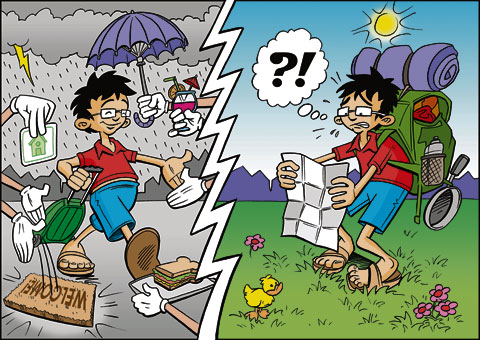Is there a best time to enrol at TU Delft? More attention from the university in Fall but perhaps more independence in the Spring semester? Students reflect on their introductions to TU Delft.
Start of a new semester, many apprehensive faces on campus. Getting lost, coping with the Dutch ‘sandwich’ lunches, hanging around trying to make yourself feel part of Delft culture. The new academic year for all TU faculties starts in the Fall semester. The faculties of Industrial Design Engineering (IDE) and Technology, Policy and Management (TPM) however also offer Spring semester intakes for regular MSc programmes, and many international exchange students enrol in Spring as well.
So the question is: what’s better, Fall or Spring semester enrolment? And, moreover, does TU Delft’s big, week-long Introduction Programme – with its welcoming activities built around networking, intercultural project-based trainings and many ‘how to’s’ for life in the Netherlands – held only for Fall semester students really matter that much to new international students?
Looking at the numbers, the Fall semester rules: 700 international students start in fall compared to Spring’s 20 regular MSc programme students plus international exchange students. “The International Office encourages students to start their studies in the first, or fall, semester, since students then have more time to acculturise,” says Germaine Poot, of the TU’s International Office.
In addition to the week-long Introduction Programme, Fall semester starting international students also enjoy the benefits of TU Delft’s Online Summer Programme for international students in July, plus the long summer vacation months to find jobs and alternative housing.
Students arriving for the Spring semester, meanwhile, arrive just in time to start February’s second semester, when housing options are scarce and many new friendships already made. The faculties of IDE and TPM organise their own introduction programmes for new Spring semester students, who also receive welcome packages and a welcome party, but nothing on the grand scale of fall’s Introduction Programme, an event that Marcela Izaguire, a Spring semester starter from Mexico, says she missed: “I’ve heard lots about the Fall introduction week and it’s totally different from the Spring experience, as in Fall you get lots of attention from the university, which is really important for helping you to start off on the right foot and feel more confident in this new experience.”
Amrita Kumar, from India, a recent IDE graduate who enrolled in Spring of 2007, agrees: “That first week was utter chaos – appointments with Duwo, the Gemeente, hospital for TB tests, and all while constantly getting lost in the city centre.” She says the one-day introductory session for Spring semester enrollers helped her with issues like connecting to the TU Delft network, but mainly she had to figure things out herself: “Fall students have an advantage over Spring students, not least because the Fall introduction week helps students make new friends.”
As for Fall semester students, most are happy to have experienced Introduction Programme, a fact backed by statistics: 80% of students surveyed say they felt more comfortable about living in Holland after attending that event.
Op het groene grasveld, voor het NAi-gebouw, staat een joekel van een roze-rode tent. Wie niet beter weet, verwacht een grote familie onder het tentzeil aan te treffen, maar niets is minder waar. Kunstenaar Hans Kalliwoda woont, leeft en werkt in de multifunctionele tent met ingebouwde container. Twee grote molens steken uit het tentdak en snorren in de opstekende wind. Kalliwoda tuurt op de meters om te zien hoeveel energie de molens leveren. “Het is jammer dat het bewolkt is en regent”, zegt Kalliwoda terwijl de regen op het dak tikt. De zonnepanelen leveren met lentebuien niet zoveel op. “47 Watt komt er nu binnen. Niet veel, maar het is wat.”
In de tijdelijke tent/containerwoning ‘The World in a Shell’ is het kiezen tussen koud bier of een warme douche. Even aanpassen, maar Kalliwoda geniet van het leven in een zelfvoorzienende container. “Veel mensen zijn voor duurzaamheid, maar consumeren op grote schaal. Ik probeer uit te vinden hoe het is om echt duurzaam te leven.”
TU-studenten van verschillende faculteiten hielpen Kalliwoda de afgelopen jaren bij de techniek en energievoorziening van de tent. De stroomkabels, die tegelijkertijd data afgeven, zijn bedacht door studenten luchtvaart,- en ruimtevaarttechniek.
Kalliwoda zegt veel te hebben gehad aan de samenwerking, maar het was ook leerzaam voor de studenten. “Faculteiten op de TU werken meestal niet samen. Tijdens mijn project wel. ‘The World in a Shell’ moest een geheel worden, qua structuur en technische snufjes. De kabels van de L&R-studenten werden door andere studenten verder ontwikkeld.”
Wetenschappers van de UVA berekenen hoeveel energie Kalliwoda moet opwekken voor zijn apparaten. Koken doet hij op een kubusvormig kookstel. Hij kan zijn container ombouwen tot een bioscoop of laboratorium en zijn computer houdt het verbruik van alle apparaten bij. “De energiebalans wordt door wetenschappers en computers goed in de gaten gehouden”, legt hij uit terwijl vrienden thee uitdelen aan bezoekers van de tent.
De kunstenaar verwacht geen grote energieproblemen als hij straks met ‘World in a Shell’ van het Rotterdamse grasveld naar Unesco-werelderfgoed in Mongolië, Ecuador, Botswana en Australië verkast. Hij verwacht veel van zijn verblijf in de woestijnen en verlaten vlaktes. “Dit is ook een antropologisch project. Veel mensen denken dat technologie sociale problemen in de maatschappij kan oplossen, maar ik hoop juist bij de bushmen in Afrika veel nieuwe ideeën op te doen.”



Comments are closed.